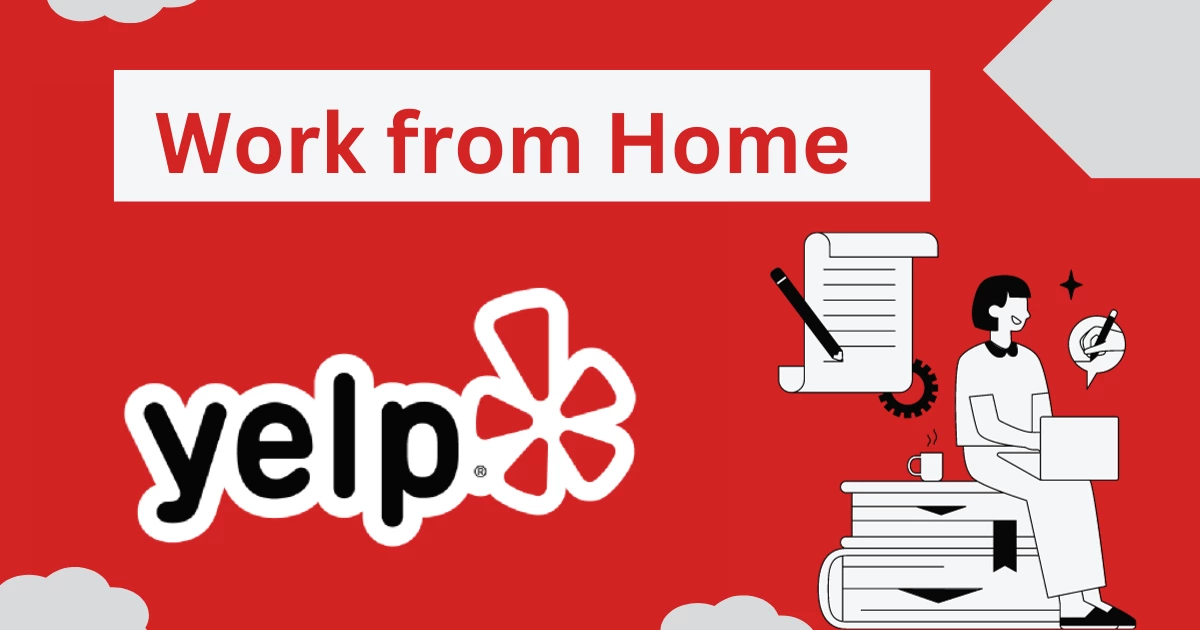Yelp Work From Home: Explore Yelp’s Insights: 7 Best Facts to Know
Is Working from Home the Future? Explore Yelp’s Insights
Are you looking to find Yelp work from home, if yes let’s discuss comprehensively step by step how to start Yelp work from home. With the advancement of technology and online work, many companies are providing more opportunities to start working from home. In other aspects let se is working from home in the future. In this article, we will go deeply into Yelp’s insights to explore the potential of Yelp Work From Home as a long-term solution.

Yelp, the popular online review platform, recently conducted a survey of consumer behavior. They figure out valuable insights that remote work is definitely impacting various businesses and industries. By examining the data, it is clear that Yelp working from home can be a good idea.
From increased productivity to improved work-life balance, there are undeniable advantages to working from home. However, there are also challenges that employers and employees face in this new paradigm. By exploring Yelp’s insights, we aim to uncover the opportunities and obstacles of remote work, shedding light on whether it is here to stay.
Advantages of Yelp Working From Home
Yelp work from home and offers many advantages for both employers and employees. The main benefit of working from home is increased productivity. Without the following of a traditional office setting, employees often find they can focus better and complete tasks more efficiently from their homes. In fact, according to Yelp’s study, businesses that implemented working-from-home policies saw a significant rise in productivity levels.
Additionally, working from home allows for greater flexibility and work-life balance. Employees have the freedom to set their own schedules and eliminate the daily commute, resulting in more time for personal activities and family commitments. This improved work-life balance can lead to higher job satisfaction and overall well-being.
Another advantage of remote work is the potential cost savings for both employees and employers. Without the need for a physical office space, companies can reduce expenses associated with rent, utilities, and office supplies. Employees also save money by cutting commuting costs and having the option to prepare meals at home instead of eating out.
Disadvantages of working from home
Although there are many advantages to working from home, it’s important to acknowledge the challenges that come with this new way of working. One of the main disadvantages is the potential for blurred boundaries between work and personal life. Without a clear separation between you and the other environment, it can be difficult for employees to disconnect and recharge, leading to burnout and decreased productivity in the long run.
Another challenge is the lack of face-to-face interaction and the potential for decreased collaboration and teamwork. While technology has already made it easier to communicate remotely, there is still a certain level of connection and synergy that can only be achieved through in-person interactions. This is particularly relevant for industries that rely heavily on creativity and innovation.
Lastly, working from home can be isolating for some individuals. The absence of social interactions with colleagues can lead to feelings of loneliness and decreased motivation. It is crucial for employers to prioritize employee well-being and find ways to foster a sense of community and connection, even in a remote work environment.
The Rise of Remote Work
Even before the pandemic, remote work was gaining popularity. However, the global health crisis accelerated this trend, forcing companies across the globe to adopt remote work policies to ensure business continuity. According to Yelp’s research, industries such as technology, finance, and professional services were quick to transition to remote work, while others faced more challenges due to the nature of their work.

The shift towards remote work has been facilitated by advancements in technology and digital collaboration tools. From video conferencing platforms to project management software, there are numerous tools available to support remote work and enable teams to collaborate effectively from different locations.
Yelp’s insights on remote work
Yelp’s study provides valuable insights into the impact of remote work on various industries. The data reveals that businesses that successfully adapted to remote work saw an increase in customer satisfaction and loyalty. This suggests that remote work can have a positive impact on the overall customer experience, as employees have more flexibility to address customer needs and provide personalized support.
Furthermore, Yelp’s research highlights the importance of effective communication and transparency in a remote work environment. Companies that maintained open lines of communication with employees and provided regular updates on business operations experienced higher levels of employee engagement and satisfaction.
Key findings from Yelp’s research
Yelp’s research identified several key findings that shed light on the future of remote work. One of the notable findings is the potential for cost savings. Businesses that embraced Yelp work from home reported significant reductions in overhead expenses, allowing them to allocate resources to other areas of the business.
Another important finding is the increased focus on employee well-being. Companies that prioritized the mental and physical health of their employees saw higher levels of productivity and overall job satisfaction. This highlights the importance of creating a supportive work environment, even in a remote setting.
Industries have adapted to Yelp Work from Home
Different industries have faced unique challenges when transitioning to remote work. For example, industries that heavily rely on physical presence, such as hospitality and retail, have had to pivot their business models to adapt to the new reality. Many restaurants and stores have shifted to online ordering and delivery services to continue serving customers.
On the other hand, industries that are more digitally oriented, such as software development and marketing, have found it easier to transition to remote work. These industries already had the infrastructure and tools in place to support remote collaboration, making the transition smoother.
Tips for Yelp Work from Home
To thrive in a remote work environment, both employees and employers can benefit from implementing certain strategies. For employees, creating a dedicated workspace, establishing a routine, and setting clear boundaries between work and personal life are crucial. It’s also important to maintain regular communication with colleagues and take advantage of collaboration tools to stay connected.
Employers can support remote work by providing the necessary tools and resources for employees to be productive. This includes investing in reliable technology, offering training on Yelp work from home and its best practices, and fostering a culture of trust and open communication. Regular check-ins and virtual team-building activities can also help maintain team cohesion and morale.
Tools and technologies for remote collaboration
The success of remote work relies heavily on technology and digital collaboration tools. There are numerous platforms available to facilitate communication, project management, and team collaboration. Some popular tools include video conferencing platforms like Zoom and Microsoft Teams, project management software like Asana and Trello, and instant messaging apps like Slack and Microsoft Teams.
It’s important for companies to assess their specific needs and choose the right tools that align with their remote work requirements. With the right technology in place, teams can collaborate effectively, regardless of their physical location.
The COVID-19 pandemic has forced businesses and employees to adapt to remote work at an unprecedented scale. While there are advantages and disadvantages to this new way of working, Yelp work from home is here to stay in some capacity.
As companies continue to navigate the evolving landscape of work, it’s important to find the right balance between remote and in-person work. The future of work is likely to be a hybrid model that combines the benefits of remote work with the advantages of in-person collaboration.
By leveraging the insights provided by Yelp’s research and implementing strategies to address the challenges of remote work, businesses can position themselves for success in the future. With the right tools, technologies, and a focus on employee well-being, Yelp work from home can be a viable long-term solution.
So, does Yelp work from home have the future? The answer is not a simple yes or no. It’s a nuanced approach that requires careful consideration of the specific industry, company culture, and individual needs. As we move forward, it’s clear that Yelp work from home will continue to shape the future of work, offering new opportunities and challenges for businesses and employees alike.



